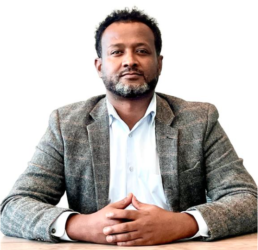
Getachew obtained his first degree from Addis Ababa University’s Political Science and International Relations department PSIR. He holds an M.A. in International Relations from Addis Ababa University and an M.A. from the University of Leeds, UK, in Political Communication. Getachew served as Director General at the Ethiopian Ministry of Foreign Affairs and worked as Secretariat for the Foreign Policy Review Team. Upon Joining the private sector, Getachew worked as a senior political editor at The Reporter Newspaper in Ethiopia.
China’s Foreign Ministry appointed a Special Envoy to the Horn of Africa, Xue Bing attended the first ever ‘China-Horn of Africa Good Governance, Peace and Development Summit held in Addis Ababa, Ethiopia, from June 20 to June 22, 2022. Senior officials and representatives of Ethiopia, Djibouti, Somalia, Kenya, Uganda, Sudan, and South Sudan were in attendance at this event that is to mark a shift in China’s partnership model, particularly with Eastern Africa. Zhao Zhiyuan, China’s Ambassador to Ethiopia, who was also in attendance, insisted on the presence of the Chinese Special Envoy at the summit upon invitation; adding that China doesn’t have any other agenda than assisting development and peace prospects in the Horn of Africa.
The conference, led by H.E. Xue Bing, was also intended to encourage dialogue between the Government of Ethiopia (GoE) and the Tigrayan People’s Liberation Front (TPLF) but looked into discussing the crisis and conflict plaguing the broader region. This raises several critical questions worth considering.
First, what is the actual interest of the Chinese government in the Horn of Africa, particularly, how may this summit serve in bolstering regional peace? It is a fact that Horn States owe the Chinese government billions of dollars in debt, hence conflict conditions and instability in the region will not only result in the loss of critical partners in the region but also a massive economic loss incurred by the Chinese government.
The Chinese Government’s Belt and Road Initiative (BRI) lays out a clear framework for diplomatic engagement, economic cooperation, resource self-sufficiency, and more to expand China’s cooperation with African partners.
The Chinese Government’s Belt and Road Initiative (BRI) lays out a clear framework for diplomatic engagement, economic cooperation, resource self-sufficiency, and more to expand China’s cooperation with African partners. Despite multiple security threats posed by various entities, one must ask: “if not for the geostrategic and economic incentives the Horn region offers, would China’s government have prioritized such a high-level engagement with the region’s governments?” The answer is likely NO. Given the Chinese government’s prior engagements with the African States, it is a recent phenomenon for China to pioneer good governance and peace initiatives in other countries. As is the case with most Horn Governments, China seldom comments on political developments and prefers not to involve in protection, de-escalation, or peacebuilding initiatives. However, The contrary is true when it comes to its deeply entrenched involvement in African economies. What accounts for the sudden shift towards peace and development, as well as good governance? Could it be a protective mechanism for its investment holdings in these countries?
Africa’s stability matters to China. China is not only involved in trade and investment and infrastructure development but Chinese companies are also heavily involved in mineral exploration and widespread mining in Africa. The continent’s rich natural resources, and ample market for services and goods, are increasingly attractive to China; hence instability in Africa means it cannot exploit the mineral and economic prospects in Africa.
However, the terms of these loans are not disclosed to the public- remain a secret between the signatory African heads of state and China.
Africa’s raising debt to the Chinese government exceeds 140 billion USD and at least 18 African countries have been renegotiating the terms of their past agreements. However, the terms of these loans are not disclosed to the public- remaining a secret between the signatory African heads of state and China. These loans, through the so-called “Peaceful Development initiative” often take infrastructures from poor African countries as protection or guarantee. It only becomes public knowledge when countries in debt default on their payment and settlements become difficult.
Chinese loans are often considered predatory. When asked, most African governments and China would claim that their partnership is a “win-win.” However, heavy Chinese investments, particularly in infrastructure development are said to be highly impropriety; the African officials signing these loan agreements often advance their individual interests under the cover of secrecy. The Chinese government itself provides certain shields for corrupt African officials. This is by providing officials from African governments with the power of signing infrastructure loan agreements a grand corruption platform that makes them commit to these unethical loans. The Heritage Foundation in its piece ‘Chinese Corruption in Africa Undermines Beijing’s Rhetoric about friendship in Africa’ claims’ that Beijing either encourages or ignores corruption and that China’s government-linked and government-owned companies habitually use corruption that hurts ordinary Africans.
Infrasture development in Ethiopia and other African countries often fails to repay their loans, further entrenching the into dependency.
Infrasture development in Ethiopia and other African countries often fails to repay their loans, further entrenching the into dependency. For example, six years after launching the first Sub-Saharan Africa light rail system, the Addis Ababa transit system went from bad to worse. According to The Reporter news Paper, during its first four years, the transit system earned a gross revenue of 11 million USD; it, however, needs 154 million USD to operate. The General Auditor’s report shows that the rail system falls far short of its original feasibility study. ‘The feasibility study has been inadequate, and it was conducted without collecting enough information.’ Who is responsible for these kinds of irresponsible loans? Officials in African governments or China?